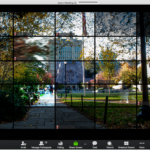
Courtesy of the AFAM House
On March 5, the Office of LBGTQ Resources hosted a panel discussion on transfemininity in social media. The office welcomed Black transgender social activist and model Jessica Zyrie, as well as Latinx bisexual nonbinary trans woman and influencer Rosalynne Montoya as speakers at the event.
This panel, co-sponsored by the Yale Schwarzman Center and moderated by Ale Campillo ’22, was the second event in the center’s Trans Visibility Series. This series is organized by Campillo, Nash Keyes ’21 and Akweley Lartey ’23.
“I think back to my younger self; I needed trans people showing up and saying, ‘We are here, we are beautiful and we are fully deserving of the same respect and praise as any cisgendered person,” Montoya said.
Campillo began the discussion by quoting Daphne Brooks, a professor of African American studies and women, gender and sexuality studies: “We are all beholden to each other.” The panelists then acknowledged Yale’s place on Quinnipiac land, as well as the recent passing of the office’s Associate Director Andrew Dowe ’08 GRD ’20 and Zoom bombing attacks at recent events sponsored by the Office of LGBTQ Resources.
Campillo said Dowe was “an incredible ally and a wonder human” who meant a great deal to people. The Trans Visibility Series was one of the last projects that Dowe oversaw. According to Campillo, the center is fulfilling Dowe’s wishes through the series, as Dowe was extremely excited about the project.
Due to the recent Zoom bombings, the panel was hosted in a webinar format and only accessible to those with Yale-affiliated email addresses. Campillo noted that the series on trans visibility is extremely timely in light of these attacks.
“To put it bluntly, our community has been under attack as of late,” Campillo said. “Transphobia and racism has real-life implications, even for students at Yale.”
During the discussion, Zyrie and Montoya shared their personal experiences and perspectives as visible trans women in the media.
“Rose is using her platform on TikTok to respond to questions and educate,” Campillo said. “On the flip side, Jessica has this great modeling career and works for one of the largest LGBTQ nonprofits in Texas as a counselor.”
Zyrie reflected on her experiences as a trans woman of color in the modeling industry. She said the industry was not built for trans women or women of color, since it often demands a specific aesthetic from models.
Zyrie started modeling in college after transitioning at the age of 17. She noted that when growing up, she was conditioned against seeing beauty in herself because of her identity as a Black queer woman.
Montoya discussed her TikTok account and the backlash she faced after using her account to answer questions about her trans experience. She mentioned that her account was briefly shut down due to a high number of false reports of community guideline violations. Yet she retrieved her account by creating petitions, contacting TikTok and speaking out about the issue.
“I’m thankful that I got my account back and that I am able to continue to spread the education that I do,” Montoya said. “But, it’s not about me; it’s about TikTok needing to stop discriminating against marginalized voices. I’m passionate about changing that.”
Montoya, who also models, said the experience has been affirming and healing. “I am telling myself, but I am also telling the world that I am worthy,” Montoya said.
Both Montoya and Zyrie discussed the importance of representation in their fields. Still, they said visibility is not for everyone — especially if one does not feel safe.
Then, Zyrie quoted late writer and trans historian Monica Roberts, saying that “we’re planting seeds to trees we may not see the shade from.”
Either through modeling, educating strangers or taking time out to speak with Yale affiliates, Montoya and Zyrie hope to plant seeds that help future trans people succeed.
The Trans Visibility Series has two more events in March: a concert from trans artists and a panel on “Queering the (In)Dustry.”
Maia Decker | maia.decker@yale.edu








